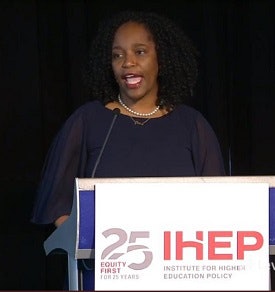WASHINGTON – Achieving equity for low-income students in post-secondary education requires getting down to the nitty-gritty of what they need, and the Institute for Higher Education Policy provided a forum for that Tuesday with a summit featuring game-changing institutional leaders, the release of a special report and in-person perspectives of students who have overcome major finance-related obstacles on their way to a degree.
 Dr. Michelle Asha Cooper
Dr. Michelle Asha CooperThe six-hour summit at the Newseum, which drew educators, policymakers and other stakeholders from across the nation, included the unveiling of “The Cost of Opportunity: Student Stories of Affordability.” The 35–page report was the result of a comprehensive study by IHEP in which a diverse array of 17 low- and moderate-income college students were interviewed throughout two semesters of their college journeys to ascertain how their financial challenges could inform policies to promote affordability and completion.
Three key take-aways of the study were that the success of low-income and working-class students often is jeopardized because they are forced to make “unacceptable” decisions about how they will make ends meet; a confusing and complicated financial aid process causes great uncertainty about whether they will be able to afford school from semester to semester and year; and targeted need-based financial aid is crucial to helping these students overcome manifold affordability barriers that contribute to disparate outcomes.
The comprehensive report also made more than a dozen state, federal and policy recommendations, among them:
· State free-college programs should invest first in low-income students, expand to fund non-tuition school-related costs and support targeted need-based programs.
· Schools should establish funds that provide emergency grants to students, as often even a small one-time financial crisis can force a student to leave school and not return.
· Federal policymakers should adjust federal needs-analysis rules to allow for a negative family-estimated contribution in order to better account for true student need and direct more grant aid to the lowest-income Pell grant recipients.
· Schools should broaden efforts to combat food insecurity, such as keeping dining halls open during school holidays and helping eligible students access supplemental Nutrition Assistance Program (SNAP) benefits.
IHEP president Dr. Michelle Asha Cooper promised that the gathering would elevate student voices, and some of the students interviewed for the report shared stories of financial struggle as well as ideas for systemic improvement.
“I’m a little traumatized by the things we expect students to do to access and complete a college education,” she said midway through the event. “We have to do better.”
Contrary to the stereotype that international students come from wealthy families, George Mason University rising senior Nada Elhawary has struggled financially. Things got tougher after she received her associate’s degree at Northern Virginia Community College and transferred to George Mason University in pursuit of a bachelor’s degree in global affairs.
Although Elhawary works while attending school, she realized she would have to take full class loads to finish in four years and prevent additional school-related borrowing. Her mother returned to Egypt, and it’s been tough making ends meet trying to pay for school, rent and all other costs of living, with budget worksheets and financial aid rules that are unclear and confusing.
 Yuderka Cruceta, DeJoiry McKenzie-Simmons and Nada Elhawary
Yuderka Cruceta, DeJoiry McKenzie-Simmons and Nada ElhawaryShe has suffered through injuries without health insurance, bought the cheapest brands of food and put off buying textbooks for classes until nearly a month into the term – making it difficult to catch up by the end of the semester, when she is required to vacate her residence hall within 24 hours of taking her final exam. Having no family in the U.S., that added housing insecurity to her stresses.
DeJoiry McKenzie-Simmons was surprised when he started Howard University without all the financial aid he was expecting, and he survived numerous financial crises to graduate this spring – thanks partly to his parents sacrificing to help him make ends meet with more loans.
A $1 change in his financial-aid eligibility calculations his senior year changed his estimated family contribution status, adding thousands of dollars in out-of-pocket costs that necessitated additional loans for the working student. Plus, he incurred moving expenses to find more affordable housing and then had to rely on rideshares because his home was off the metro line, adding stress related to transportation, housing, food and other routine expenses in addition to direct college costs.
Along the way, like many low-income and working-class students who must work to support themselves and their education, he had to forego valuable opportunities for study abroad and plum internships that didn’t offer pay.
“It motivated me in a way, but I know I could have done so much more if the stress wasn’t there,” said the political science major. “Those opportunities would have broadened my college experience. Those are opportunities that change people’s lives. You’re always worried about what is going to happen next. It takes emotional and sometimes physical tolls. Many times I went through that.
“But I wasn’t going home without my Howard degree. Something in me told me to continue. I had a dream and a goal.”
For Dominican immigrant Yuderka Cruceta, her children and always having a “plan B” helped her persevere through financial hardship and obtain her bachelor’s degree this spring from Lehman College in the City University of New York system.
Working two part-time jobs, including in student financial affairs, helped her make ends meet, but the struggle was real. Even finding and applying for everything for which she qualified wasn’t enough to pay for school and support her family, said Cruceta, who transferred from Bronx Community College after earning an associate’s degree.
Now, she’s set to begin working full-time as a college financial aid counselor, using her experiences and training to help other students gain access and persist financially.
But institutional policies shouldn’t make it so difficult, said several speakers.
With student-sensitive efforts such as generous emergency funds and a debt-forgiveness initiative, Wayne State University has been a national leader in providing financial and emotional support to low-income and working-class students.
“It’s letting them know that you don’t just see them, but you hear them,” said Dawn Medley, associate vice president for enrollment management. “Schools keep putting burden of success on the back of the student. You really have to listen to your students and what they need if you are going to clean up the water and change the system.”
In keynote remarks, Paul Quinn College president Dr. Michael J. Sorrell discussed innovations at his Texas school that put students’ needs at the forefront and help them succeed. It’s time for colleges and universities to listen to students – their “customers” – and employers, neither of which is happy, he said.
“This is a bad business model,” he said. “This is why people are so angry with us. They have told us what they want, and we don’t listen.”
The clear challenge to higher education, Cooper said after the six-hour summit, is to implement policies that simultaneously address the one-two punches of the high total cost of college and insufficient financial aid.
“This is a huge part of why students can’t afford college, even community college,” she said. “Even though it’s bad, they still have not lost hope. But the system should not be this hard.”


















